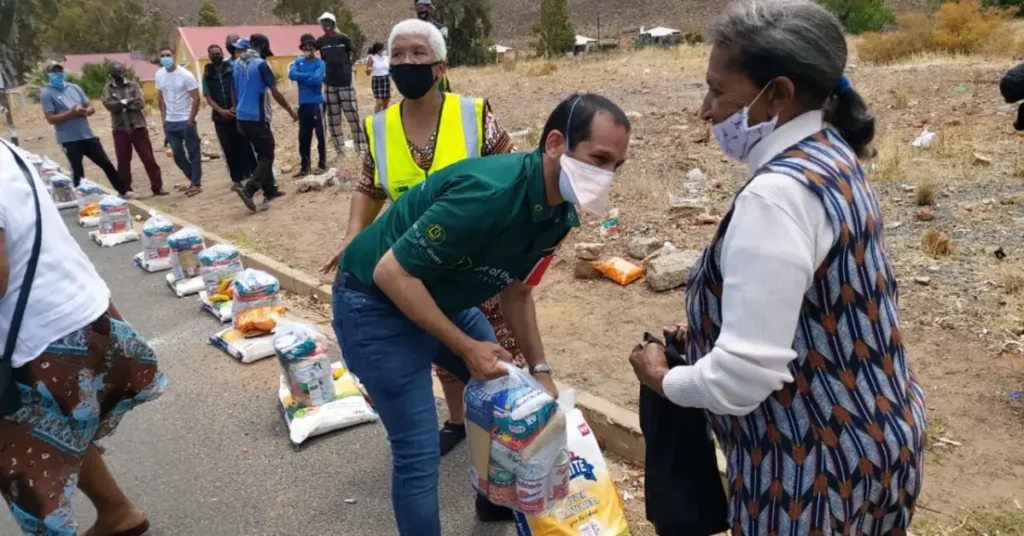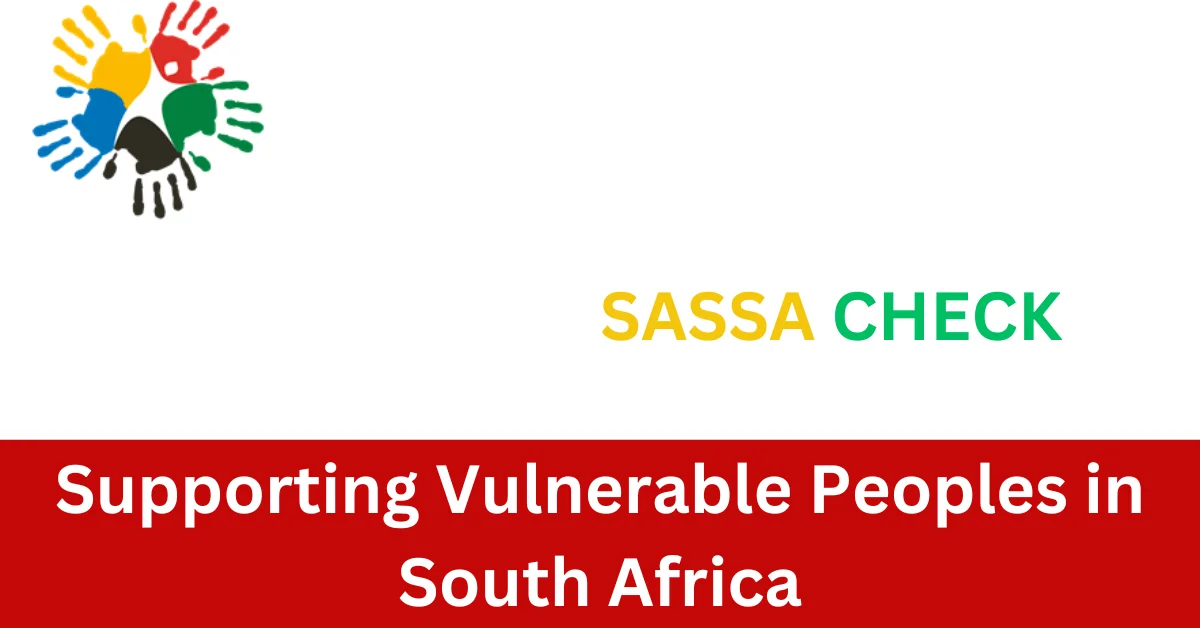Supporting Vulnerable Peoples in South Africa. South Africa’s vulnerable populations need to be supported in order for individuals and community members to overcome various challenges.

A wide range of vulnerable groups across the United States require targeted intervention and support. From food insecurity and poverty to health disparities, and limited education opportunities, these populations need targeted assistance and systems. The term “vulnerable” covers a broad range of populations, such as the elderly, disabled, HIV-positive individuals, and refugees.
Assisting these groups can not only promote social justice and human right but also encourage inclusive development, resilience and inclusion in the community. This blog explores South Africa’s need to assist vulnerable groups and outlines key initiatives and strategies that are being implemented.
Also Read: https://www.sassagrantsalerts.com/south-africas-welfare-and/
What Can We Do to Support South Africa’s Vulnerable Residents?
The support of vulnerable South Africa citizens that cannot afford living costs involves various initiatives and strategies aimed at meeting their immediate needs, and giving them the tools they need for a sustainable future. Here are some of the ways that you can provide assistance:
- Programmes of Social Welfare: These government-run programs provide vital assistance to vulnerable citizens. Social grants, food aid programs and housing subsidies will be included in these programs. These programs are designed to relieve financial pressures and provide basic necessities. SASSA offers SRDR350 in grants to those who are unemployed.
- Health Care Accessibility: It’s important that vulnerable populations have access to affordable, accessible and quality healthcare. Expanding healthcare facilities to underserved regions, providing free and subsidised healthcare, as well as implementing health-education programs, will all be necessary.
- Skills Development and Education: Supporting vulnerable individuals in breaking the cycle of poverty by investing in educational and skills-development programs. This can include providing adult education and training opportunities, as well as vocational and educational scholarships to help increase employment and income.
- Employment: Create job opportunities targeted specifically at vulnerable group can improve their economic status. Government employment schemes, partnerships in the private sector and programs that promote entrepreneurship can help achieve this.
- Community Networks: The building of strong communities support networks are fundamental to providing emotional and social support to the most vulnerable citizens. Community centers, support programs and outreach can be established to encourage collaboration in communities.
- Access To Basic Services Providing access to electricity, clean water and sanitation is crucial to improving the living conditions in vulnerable communities. Governments and nonprofit organizations can join forces to improve service delivery and infrastructure in low-income areas.
- Policy Reform and Advocate: Promoting policy reforms which address vulnerability’s root causes, like inequality and discrimination (such as racism), is essential. This involves advocating for policies and programs that promote social justice, including land reform.
- Promotion of Financial Inclusion Giving vulnerable citizens access to services like savings programs and microfinance can enable them to better manage their finances.
- Gender Based Violation:Promoting vulnerable women, children and families requires a comprehensive approach to addressing gender-based issues. Implementing comprehensive assistance services, legal safeguards, and public awareness campaigns could help tackle this problem.
- Partnerships & Collaboration: Building solid partnerships among government agencies and non-profit organizations as well as businesses and local communities will maximize resources for the most vulnerable residents and help them implement comprehensive programs.
Challenges facing Vulnerable groups
South Africa’s vulnerable communities face many challenges that have a significant impact on their wellbeing and quality of living.
- Low Income and Unhealthy Living Conditions: An important portion of underprivileged people live in regions with poor living conditions. They lack basic necessities such as access to clean water supplies, sanitation and electricity. Poor living conditions are linked to health issues, which can affect your quality of daily life.
- The problem of food insecurity is a major concern for many vulnerable people, who lack access to adequate and nutritious food. The result can be malnutrition and stunted growth of children.
- Barriers to Education for Vulnerable Groups: These groups are often faced with barriers to education such as lack of resources, distance from school and socioeconomic factors. They are then limited in their ability to develop personally and economically.
- Healthcare disparities: Many people who are vulnerable lack access to health care services because of financial limitations, geographic isolation or an inadequate infrastructure. The result is untreated diseases and higher mortality rates.
- Unemployment & Underemployment: Vulnerable individuals often struggle with finding stable employment and meaningful income-generating opportunity. This leads to a cycle of poverty and dependance.
- Exclusion from Social Life:Exclusion is a result of discrimination against vulnerable groups based upon race, status, gender and disability.
- Gender-Based violence:Women, children, and vulnerable groups are at greater risk for gender-based violent acts, such as domestic abuse, sexual violence and exploitation.
- Drug Abuse: Due to stress, trauma and lack of social support, they may abuse substances to cope. Substance use can worsen health and other social problems.
- Environmental challenges: In addition to climate changes, environmental pollution and disasters that can impact livelihoods or exacerbate vulnerability, vulnerable communities face a number of other issues.
- A Lack of Supportive Systems: Many vulnerable people lack support from their social network and the community, both of which are vital for well-being and resilience during crisis.
It is important to support people and intervene.
The nation must make reforms that will help to provide support to those in need. Some of these suggestions are:
- Dignity for Human beings: Maintaining the dignity inherent in every person, irrespective of his or her socioeconomic situation.
- Towards Social Justice: Promoting justice and equality through redressing disparities, and offering opportunities to marginalized groups.
- Healthcare Equity: Access to health care services is ensured and disparities in healthcare are addressed to enhance overall wellbeing.
- Educational and Empowerment : Empowering people through education and skill development in order to break poverty’s cycle.
- Economic Stability Supporting vulnerable groups contributes towards economic stability.
- Community resilience:Building strong, resilient communities that can overcome challenges and thrive.
- Social Issues Prevention: Addressing social problems early such as drug abuse and criminality can be prevented.
- Inclusive Growth: Fostering an inclusive development which benefits everyone in society.
- Humanitarian Duty: Fulfilling our moral duty to assist those in distress and promote social cohesion.
- Future Wealth:Investing into vulnerable populations now will lead to a future that is more prosperous for everyone.
It is a conclusion.
The moral duty we have is to find out if it’s possible for us to donate money and help our fellow citizens who are in need. Our society can undergo many changes and tasks to support those in need who cannot even ask for aid due to the dignity they hold. Together we can achieve a better society for everyone, where they have the same rights.
